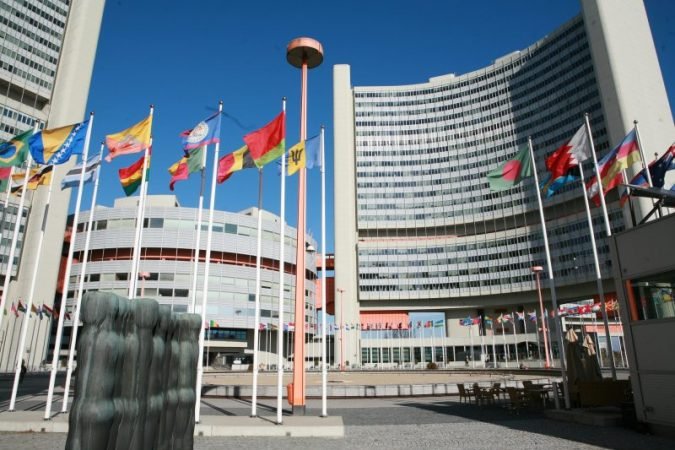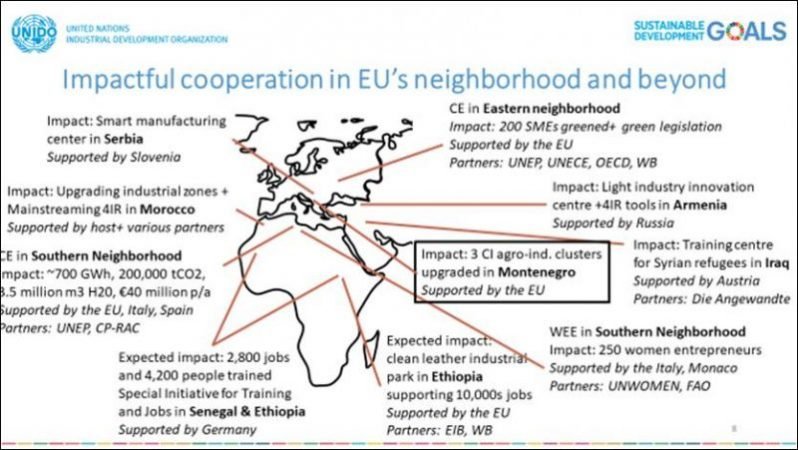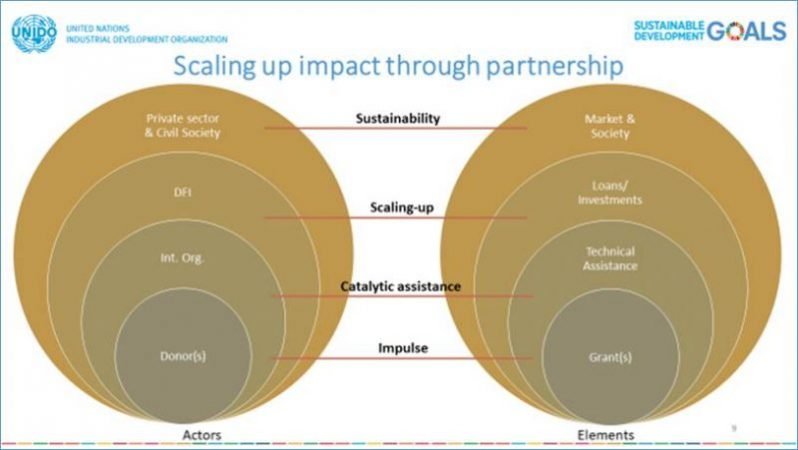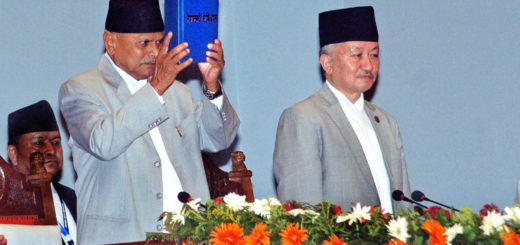Continuity in Times of Crises: UNIDO partnering the Vienna Process

On the historic date of March 08th – International Women’s Day, a large number of international affairs specialists gathered for the second consecutive summit in Vienna, Austria. This leg of the Vienna Process titled: “Europe – Future – Neighborhood at 75: Disruptions Recalibration Continuity”. The conference, jointly organized by the Modern Diplomacy, IFIMES and their partners, with the support of the Diplomatic Academy of Vienna, was aimed at discussing the future of Europe and its neighbourhood in the wake of its old and new challenges.[1]
Along with the two acting State Presidents, the event was endorsed by the keynote of the EU Commissioner for European Neighbourhood and Enlargement, Excellency Olivér Várhelyi. One of the most anticipated talks was that of the representative of the United Nations Industrial Development Organization (UNIDO, Specialized Agency of the OUN) – the UN Specialized Agency which also partnered Vienna Process for this event.
Actualizing the (re)industrialization efforts and business continuity in times of C-19 and beyond: With a focus on Europe and its Neighborhood, Florian Peter Iwinjak, of the UNIDO Strategic Relations & Resource Mobilization division stressed the following:
Mr. Iwinjak first gave a snapshot of the mandate, strategic priorities and core functions of UNIDO as shown by the figure below:

He then alluded to the importance of industry and industrialization for achieving the Sustainable Development Goals (SDGs) and overcoming the Covid-19 (C-19) crisis. On the social front, industrialization has a proven track record in reducing poverty and one job in manufacturing usually brings between 0.5-2 jobs in other sectors. On the economic front, the there is a high correlation of industrialization with growth rates, GDP, HDI and SDG index. Industrialization is unique due to its economies of scale, linkages and as a source of innovation and allows the possibility for fast-growth and “catching-up”. Moreover, labor productivity in industry is on average higher than in other sectors and it is the basis for trade as the most tradable sector. The transformation of industry is also critical to mitigate climate change and safeguard the environment since two thirds of GHG emissions are industry or energy related. Finally, industry also plays a role for peace and stability: With an increase of MVA per capita of 1%, the number of deaths related to armed conflicts falls by 4.5%. At the same time the creation of a middle class has a stabilizing effect on societies and in terms of income and gender equality.
He invited the audience to also see the current crisis as an opportunity for a (re)assessment of the socio-economic and industrial fiber, for recalibration of industrial policies, for industrial restructuring and repurposing of manufacturing capacities, and for re-skilling and upskilling. Furthermore, the crisis offers possibilities to decarbonize the economy/industry and move towards circular economy to reap the benefits of the 4th industrial revolution and digitalization (including robotization and e-commerce) or to eventually regionalize or even localize value chains (through “back-shoring”).
In order to guarantee business continuity and industrial recovery, countries can follow the following steps:
- Assessment of the impact of C-19 on the industrial sector
- Consensus building with a broad range of relevant stakeholders taking into account desired future goals for the industrial sector
- Development of a national recovery plan
- Piloting national recovery in specific industrial sectors
- Replication of pilot success interventions
At the same time, the regional dimension needs to be taken into account, since the pandemic does not stop at borders and it is unrealistic to envisage that every nation can produce every product or service deemed as critical for the post-C-19 recovery phase.
Looking at the joint priorities between the EU and its Neighborhood we see a strong convergence around the following priorities: C-19 recovery (internal & external), Good governance & rule of law, Green Deal / Transition, Job creation & safeguarding, inclusive growth, human development (esp. youth & women), private sector development (especially for SMEs), trade & Investment, Aid for Trade and last but not least digitalization & innovation.
UNIDO has been supporting many of these joint priorities related to its mandate Inclusive and Sustainable Industrial Development (ISID), which is also reflected in SDG 9 on Build resilient infrastructure, promote inclusive and sustainable industrialization and foster innovation. Over the last years UNIDO’s mandate has been further strengthened through the Lima Declaration (2013) and Abu Dhabi Declaration (2019) adopted by its Member States.
Based on its mandate, UNIDO has supported these joint priorities of the EU and its Neighborhood over the recent years. The figure below provides selected examples of impactful interventions in the EU’s Neighborhood and beyond.

At the same time, there are ways to further scale-up cooperation through multi-stakeholder partnerships. In Mr. Iwinjak’s opinion the assistance provided by donors through grants, classical Official Development Assistance (ODA), is only an impulse and the technical assistance provided by implementing partners such as UNIDO should ideally be catalytic to leverage additional investments from Development Financing Institutions (DFIs). Further downstream these scaled-up solutions should allow for real mainstreaming in the economy and society thereby guaranteeing longer-term sustainability. Please see the figure below as a simplified visualization of ways for scaling up.

Finally, a good example of scaling-up and integration is UNIDO’s Programme for Country Partnership (PCP) which have been institutionalized with partner countries since 2013. The PCP is characterized by strong government ownership at the highest political level, is founded on a multi-stakeholder partnerships from programme design to implementation. It focuses on a select number of priority sectors and areas essential to the national industrial development agenda, and facilitates the mobilization and coordination of three streams of financial resources (development assistance, public finance and business sector investment). Currently, their PCPs in Ethiopia, Senegal, Peru, Morocco and Cambodia are being implemented. Seven other PCPs in Kyrgyzstan, Egypt, Zambia, Cote d’Ivoire, Rwanda and Tanzania are in the programming phase.
The overall key messages and ideas for future endeavors of Mr. Iwinjak’s intervention were:
- Industry and industrialization play a crucial role for sustainable development and recovery from the C-19 crisis
- C-19 recovery can be seen as opportunity for positive transformation to build back better: more inclusive, more sustainable, and more digitalized
- Europe’s history and future is closely linked with its neighborhood, thus the partners should continue strengthening their partnerships and think of co-industrialization
- Based on joint priorities, we should continue investing in productive capacity/sector
- Expand industrial cooperation dialogues between various regions (incl. private sector, academia, etc.) and use multi-lateral forums such as UNIDO
- Multi-stakeholder partnerships and cooperation will play a critical role in overcoming the crisis and scaling-up viable solutions (UNIDO PCP as good example)
Closing his mesmerizing presentation Mr. Iwinjak suggested some further readings on the topic: UNIDO (2020a): Industrialization as the driver of sustained prosperity ; UNIDO (2020b): COVID-19: Industrial Recovery Programme ; UNIDO (2020c): Responding to the CODIV-19 crisis: Pathway to business continuity & recovery – Guidance for Micro, Small and Medium Enterprises (MSMEs) ; UN (2020a): How COVID-19 is changing the world: a statistical perspective. Volume I and Volume II and UN (2020b): A UN framework for the immediate socio-economic response to COVID-19.
Finally, the United Nations Specialized Agency for Industrial Development – UNIDO expressed it preparedness to further partner IFIMES, Modern Diplomacy and associates in their Vienna Process endeavors, soon planned for Geneva and Barcelona.
[1] This highly anticipated conference gathered over twenty high ranking speakers from three continents, and the viewers from Australia to Canada and from Chile to Far East. The day was filled by three panels focusing on the rethinking and revisiting Europe and its three equally important neighbourhoods: Euro-Med, Eastern and trans-Atlantic (or as the Romano Prodi’s EU Commission coined it back in 2000s – “from Morocco to Russia – everything but the institutions”); the socio-political and economic greening; as well as the legacy of WWII, Nuremberg Trials and Code, the European Human Rights Charter and their relevance in the 21st century.



















